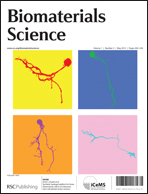
ACS Applied Bio Materials
Scope & Guideline
Exploring Breakthroughs at the Intersection of Biology and Materials
Introduction
Aims and Scopes
- Biomaterials for Drug Delivery:
Research focusing on the design and optimization of biomaterials that can effectively deliver therapeutic agents, enhancing the bioavailability and targeting of drugs. - Tissue Engineering and Regenerative Medicine:
Investigation of biomaterials that support cell growth, differentiation, and tissue regeneration, aiming to develop solutions for repairing or replacing damaged tissues. - Nanotechnology in Biomedical Applications:
Utilization of nanoscale materials and structures to improve drug delivery, imaging, and therapeutic efficacy in various medical conditions. - Biosensors and Diagnostics:
Development of biomaterials for creating advanced biosensors that enable the detection of biological markers for disease diagnosis and monitoring. - Antimicrobial and Antibiofilm Strategies:
Exploration of materials designed to combat infections, particularly those associated with medical devices and implants, through antimicrobial properties and biofilm prevention. - Smart and Responsive Biomaterials:
Creation of materials that can respond to environmental stimuli (e.g., pH, temperature) for controlled release of drugs or other bioactive agents.
Trending and Emerging
- Targeted and Personalized Medicine:
The development of biomaterials tailored for specific patient populations or disease mechanisms is gaining traction, enhancing the efficacy of treatments. - Integration of Artificial Intelligence and Machine Learning:
The application of AI and machine learning in the design and optimization of biomaterials is emerging, facilitating predictive modeling and personalized approaches. - Sustainable and Biodegradable Materials:
There is a growing focus on creating eco-friendly biomaterials that reduce environmental impact while maintaining functionality in medical applications. - Micro- and Nano-Scale Fabrication Techniques:
Advancements in fabrication techniques, including 3D printing and electrospinning, are enabling the creation of complex and functional biomaterials with enhanced properties. - Hybrid and Composite Materials:
Research is increasingly centered on developing hybrid materials that combine the beneficial properties of different components to improve performance in biomedical applications. - Immunomodulatory Biomaterials:
Materials designed to actively modulate immune responses are emerging, particularly in the context of cancer therapy and regenerative medicine.
Declining or Waning
- Conventional Materials for Drug Delivery:
There has been a noticeable shift away from traditional polymer-based drug delivery systems towards more advanced and multifunctional nanocarrier systems. - Single-Use Medical Devices:
Research focusing solely on single-use devices is decreasing as there is a growing emphasis on sustainability and the development of reusable or biodegradable materials. - Basic Biocompatibility Studies:
The focus on basic biocompatibility assessments is waning as more comprehensive studies encompassing complex biological interactions are increasingly prioritized. - Passive Antimicrobial Coatings:
The interest in passive coatings that merely inhibit microbial growth is declining in favor of more active and responsive antimicrobial strategies. - Traditional Tissue Engineering Approaches:
Classic approaches in tissue engineering are being overshadowed by innovative strategies that integrate stem cells, bioactive factors, and smart materials.
Similar Journals

Advanced NanoBiomed Research
Advancing Knowledge in Nanomaterials and BiomedicineAdvanced NanoBiomed Research is a pioneering open-access journal committed to advancing the interdisciplinary field of nanobiotechnology, published by WILEY-V C H VERLAG GMBH. Since its inception in 2021, this journal has provided a platform for innovative research that bridges the gap between engineering, medicine, and materials science. With impressive rankings in Scopus, positioning it within the top quartiles of various categories, Advanced NanoBiomed Research aims to disseminate high-quality research that contributes to the understanding and application of nanomaterials in biomedical contexts. As it encompasses a wide scope—from applied microbiology to biomaterials—it serves as an essential resource for researchers, professionals, and students eager to explore the cutting-edge developments in the field. The journal promotes a collaborative environment where emerging ideas can flourish, ensuring that vital advancements in nanobiomedicine can be shared and built upon within the scientific community.

Biomaterials Science
Advancing the future of healthcare through innovative biomaterials.Biomaterials Science is a premier journal published by the Royal Society of Chemistry that serves as a leading platform for researchers and professionals in the fields of Biomedical Engineering and Materials Science. With an impressive impact factor bolstered by its Q1 quartile ranking in both disciplines, this journal has positioned itself at the forefront of cutting-edge research, showcasing innovative materials and applications that drive advancements in healthcare and technology. Since its inception in 2013, Biomaterials Science has been committed to disseminating high-quality, peer-reviewed articles that promote scientific knowledge and collaboration among academia and industry. With a global readership and a focus on open access, researchers are encouraged to share their findings to facilitate the development of transformative biomaterials and their applications. Join a vibrant community of scholars as we explore the future of biomaterials through this esteemed publication, enhancing both scientific inquiry and practical application.

Advanced Healthcare Materials
Transforming Science into Healthcare SolutionsAdvanced Healthcare Materials, published by WILEY, is a leading journal in the interdisciplinary fields of biomaterials, biomedical engineering, and pharmaceutical science. With its ISSN 2192-2640 and E-ISSN 2192-2659, the journal provides a platform for innovative research that encompasses the design, fabrication, and application of advanced materials in healthcare settings. Recognized for its high impact, it boasts a Q1 ranking in several categories, including a notable rank of #7/183 in Pharmaceutical Science and 14/137 in Biomaterials according to Scopus rankings. This reflects the journal’s commitment to publishing cutting-edge studies that push the boundaries of science and technology in medicine. Although it operates under a subscription model, articles published in this journal significantly impact the global research community and play a crucial role in the advancement of healthcare technologies. With a publication history from 2012 to 2024, Advanced Healthcare Materials remains an essential resource for researchers, professionals, and students engaged in the groundbreaking intersections of materials science and healthcare.

MACROMOLECULAR BIOSCIENCE
Pioneering Research at the Intersection of Biology and MaterialsMACROMOLECULAR BIOSCIENCE, published by WILEY-V C H VERLAG GMBH, is a leading journal in the fields of bioengineering, biomaterials, biotechnology, materials chemistry, and polymers and plastics. With a convergence of scientific inquiry since its inception in 2001, the journal has established itself as a vital resource for researchers and professionals exploring the interface of molecular sciences and biosystems. It boasts impressive Scopus rankings, including Q1 status in multiple categories, reflecting its significant contribution to advancing knowledge and innovation in the polymer and biomaterials domains. While the journal does not currently offer open access options, its rigorous peer-review process ensures the publication of high-quality research that fuels academic discourse. Positioned in Weinheim, Germany, MACROMOLECULAR BIOSCIENCE aims to bridge theoretical understanding with practical applications, making it an essential reference for students, academics, and industry practitioners dedicated to the evolving landscape of macromolecular bioscience.

Bioengineering & Translational Medicine
Connecting Science and Medicine for Impactful OutcomesBioengineering & Translational Medicine, published by WILEY, positions itself at the forefront of innovation in the fields of biomedical engineering, biotechnology, and pharmaceutical science. With an impressive impact factor reflected through its top-tier Q1 rankings in multiple categories, the journal serves as a critical platform for disseminating cutting-edge research and stimulating discourse among professionals and scholars since its establishment as an open-access journal in 2016. Key to its mission is facilitating the translation of bioengineering research into tangible medical applications, thereby enhancing healthcare outcomes. With its comprehensive scope, it attracts a diverse readership, including researchers, industry leaders, and students eager to engage with the latest developments in translational medicine. The journal operates under robust access options, ensuring that research is freely available for maximum reach and impact, fostering collaboration and innovation across disciplines worldwide.

VIEW
Exploring Innovations at the Intersection of Science and Medicine.VIEW is a prestigious journal published by WILEY that focuses on the rapidly evolving fields of Biomaterials and Biomedical Engineering. Since its inception in 2020, VIEW has established itself as an open-access platform dedicated to disseminating high-quality research and innovation within these disciplines. With an impressive impact factor that places it in the Q1 category of both Biomaterials and Biomedical Engineering, VIEW ranks among the top journals in its field, boasting a 91st percentile ranking in Biomedical Engineering and an 85th percentile ranking in Materials Science. Researchers, professionals, and students are encouraged to utilize this invaluable resource, as it provides a comprehensive view of current advancements and future trends in biomaterial science and engineering. Positioned in the United Kingdom, VIEW operates as a vital scholarly communication link, fostering collaboration and knowledge sharing within an ever-growing global community.

Regenerative Biomaterials
Pioneering Innovations in Tissue EngineeringRegenerative Biomaterials, published by Oxford University Press, serves as a premier platform for the dissemination of innovative research in the rapidly evolving field of biomaterials. Since its inception in 2014, this esteemed open-access journal has fostered a collaborative and diverse scientific community, providing free access to impactful articles that enhance our understanding of regenerative medicine and tissue engineering. With a commendable impact factor and ranking within the top quartiles of both Biomedical Engineering and Materials Science, it is recognized for its rigorous peer-review process and high-quality publications. The journal aims to bridge the gap between fundamental research and applied sciences, promoting advanced studies that contribute to clinical applications and regeneration strategies. Researchers, practitioners, and students alike are encouraged to engage with the journal’s content to foster interdisciplinary collaboration and drive future innovations in the biomaterials domain.

Current Opinion in Biomedical Engineering
Driving progress through critical assessments.Current Opinion in Biomedical Engineering is a renowned journal published by Elsevier, focusing on the cutting-edge developments and critical assessments in the fields of biomedical engineering and related disciplines. With an ISSN of 2468-4511, it provides a valuable platform for researchers and professionals to disseminate their insights and discoveries in areas such as bioengineering, biomaterials, and medicine. Its impressive impact factor positions it in the Q2 category for several fields, including Bioengineering and Biomedical Engineering, highlighting its influence and relevance in ongoing scientific dialogues. The journal’s unique format of opinion pieces and reviews encourages innovative thinking and fosters collaboration among experts. As an essential resource for those engaged in the life sciences and engineering, Current Opinion in Biomedical Engineering serves to stimulate discussion, promote knowledge exchange, and drive advancements in biomedical applications. Set in the Netherlands at Radarweg 29, 1043 NX Amsterdam, the journal is accessible through various academic platforms, enabling a global readership to engage with the latest scholarly work in this dynamic field.

Materials Today Bio
Showcasing groundbreaking discoveries in bioengineering and biomaterials.Materials Today Bio, published by Elsevier, is an esteemed open-access journal dedicated to advancing the fields of bioengineering, biomaterials, and biomedical engineering. Since its inception in 2019, this journal has quickly made a name for itself, currently ranked Q1 in multiple categories including Bioengineering, Biomaterials, and Biotechnology, reflecting its exceptional quality and relevance in the rapidly evolving landscape of bio-related sciences. With an impressive Scopus ranking positioning it in the top 25% of its categories, Materials Today Bio provides a vital platform for researchers and professionals to share cutting-edge discoveries and innovative applications that bridge the gap between materials science and biological studies. Accessible to a global audience, this journal not only fosters collaboration among the scientific community but also aims to highlight significant advancements in cell and molecular biology, making it an indispensable resource for students and seasoned experts alike. The journal's commitment to open access since 2019 underscores its dedication to disseminating knowledge widely, ensuring that crucial findings reach those who can benefit from them the most.

Acta Biomaterialia
Exploring the Future of Biochemical and Biomedical SolutionsActa Biomaterialia, published by Elsevier Science Ltd, is a leading journal in the fields of biochemistry, biomaterials, biomedical engineering, biotechnology, and molecular biology. With an ISSN of 1742-7061 and an E-ISSN of 1878-7568, this prestigious journal has secured a remarkable position in the academic community, evidenced by its inclusion in the Q1 category across multiple disciplines for 2023. It ranks impressively at #21 in biochemistry, #16 in biomedical engineering, #18 in biotechnology, and #11 in biomaterials, reflecting its high impact and relevance to ongoing research and development. The journal provides a platform for disseminating innovative research and advancements in the design and application of biomaterials, contributing to scientific discussions that propel the field forward. Although it does not currently offer open access options, Acta Biomaterialia continues to attract contributions that advance our understanding of biomaterials and their interactions with biological systems, ensuring that researchers, professionals, and students remain informed about the latest trends and breakthroughs in this rapidly evolving area of study.